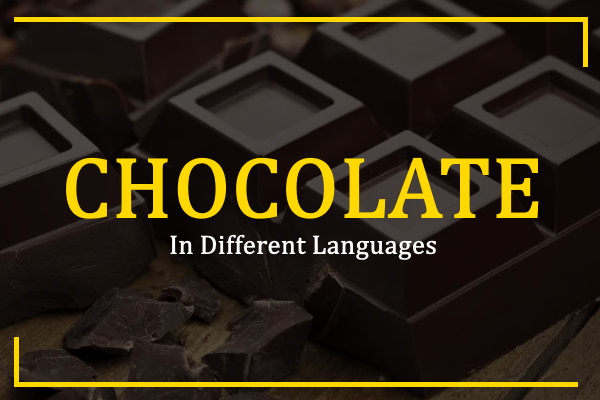Table of Contents
Chocolate in Different Languages: Chocolate is typically a soft, dark cacao preparation, produced in the form of a powder, paste, or in the form of blocks or as a sweetener component in other foods. Cocoa seeds have a strong bitter flavor and must be fermented in order to develop the taste.
Chocolate in All Languages
Translation of word Chocolate in almost 100+ different languages of the world.
| Different Languages | Word Chocolate |
|---|---|
| Albanian | cokollate |
| Basque | txokolatea |
| Belarusian | шакалад |
| Bosnian | čokolada |
| Bulgarian | шоколад |
| Catalan | xocolata |
| Croatian | čokolada |
| Czech | čokoláda |
| Danish | chokolade |
| Dutch | chocola |
| Estonian | šokolaad |
| Finnish | suklaa |
| French | Chocolat |
| Galician | chocolate |
| German | Schokolade |
| Greek | σοκολάτα (sokoláta) |
| Hungarian | csokoládé |
| Icelandic | Súkkulaði |
| Irish | seacláid |
| Italian | cioccolato |
| Latvian | šokolāde |
| Lithuanian | šokoladas |
| Macedonian | чоколадо |
| Maltese | ċikkulata |
| Norwegian | sjokolade |
| Polish | czekolada |
| Portuguese | chocolate |
| Romanian | ciocolată |
| Russian | шоколад (shokolad) |
| Serbian | чоколада (chokolada) |
| Slovak | čokoláda |
| Slovenian | čokolada |
| Spanish | chocolate |
| Swedish | choklad |
| Ukrainian | шоколад (shokolad) |
| Welsh | siocled |
| Yiddish | שאָקאָלאַד |
| Armenian | շոկոլադ |
| Azerbaijani | şokolad |
| Bengali | চকলেট |
| Chinese Simplified | 巧克力 (qiǎokèlì) |
| Chinese Traditional | 巧克力 (qiǎokèlì) |
| Georgian | შოკოლადი |
| Gujarati | ચોકલેટ |
| Hindi | चॉकलेट |
| Hmong | qhob noom xim kasfes |
| Japanese | チョコレート |
| Kannada | ಚಾಕೊಲೇಟ್ |
| Kazakh | шоколад |
| Khmer | សូកូឡា |
| Korean | 초콜릿 (chokollis) |
| Lao | ຊັອກໂກແລດ |
| Malayalam | ചോക്കലേറ്റ് |
| Marathi | चॉकलेट |
| Mongolian | шоколад |
| Myanmar (Burmese) | ခြော့ကလကျ |
| Nepali | चकलेट |
| Sinhala | චොක්ලට් |
| Tajik | шоколад |
| Tamil | சாக்லேட் |
| Telugu | చాక్లెట్ |
| Thai | ช็อคโกแลต |
| Turkish | çikolata |
| Urdu | چاکلیٹ |
| Uzbek | shokolad |
| Vietnamese | sô cô la |
| Arabic | شوكولاتة (shukulata) |
| Hebrew | שׁוֹקוֹלַד |
| Persian | شکلات |
| Afrikaans | sjokolade |
| Chichewa | chokoleti |
| Hausa | cakulan |
| Igbo | chocolate |
| Sesotho | tsokolate |
| Somali | shukulaatada |
| Swahili | chocolate |
| Yoruba | chocolate |
| Zulu | ushokoledi |
| Cebuano | chocolate |
| Filipino | tsokolate |
| Indonesian | cokelat |
| Javanese | coklat |
| Malagasy | sôkôla |
| Malay | coklat |
| Maori | tiakarete |
| Esperanto | ĉokolado |
| Haitian Creole | chokola |
| Latin | scelerisque |
Chocolate in European Languages
Translation of word Chocolate in almost 42 European languages.
| Different Languages | Word Chocolate |
|---|---|
| Albanian | cokollate |
| Basque | txokolatea |
| Belarusian | шакалад |
| Bosnian | čokolada |
| Bulgarian | шоколад |
| Catalan | xocolata |
| Corsican | cicculata |
| Croatian | čokolada |
| Czech | čokoláda |
| Danish | chokolade |
| Dutch | chocola |
| Estonian | šokolaad |
| Finnish | suklaa |
| French | Chocolat |
| Frisian | sûkelade |
| Galician | chocolate |
| German | Schokolade |
| Greek | σοκολάτα [sokoláta] |
| Hungarian | csokoládé |
| Icelandic | Súkkulaði |
| Irish | seacláid |
| Italian | cioccolato |
| Latvian | šokolāde |
| Lithuanian | šokoladas |
| Luxembourgish | Schockela |
| Macedonian | чоколадо |
| Maltese | ċikkulata |
| Norwegian | sjokolade |
| Polish | czekolada |
| Portuguese | chocolate |
| Romanian | ciocolată |
| Russian | шоколад [shokolad] |
| Scots Gaelic | seoclaid |
| Serbian | чоколада [chokolada] |
| Slovak | čokoláda |
| Slovenian | čokolada |
| Spanish | chocolate |
| Swedish | choklad |
| Tatar | шоколад |
| Ukrainian | шоколад [shokolad] |
| Welsh | siocled |
| Yiddish | שאָקאָלאַד |
Chocolate in Asian Languages
Translation of word Chocolate in almost 36 Asian languages.
| Different Languages | Word Chocolate |
|---|---|
| Armenian | շոկոլադ |
| Azerbaijani | şokolad |
| Bengali | চকলেট |
| Chinese Simplified | 巧克力 [qiǎokèlì] |
| Chinese Traditional | 巧克力 [qiǎokèlì] |
| Georgian | შოკოლადი |
| Gujarati | ચોકલેટ |
| Hindi | चॉकलेट |
| Hmong | qhob noom xim kasfes |
| Japanese | チョコレート |
| Kannada | ಚಾಕೊಲೇಟ್ |
| Kazakh | шоколад |
| Khmer | សូកូឡា |
| Korean | 초콜릿 [chokollis] |
| Kyrgyz | шоколад |
| Lao | ຊັອກໂກແລດ |
| Malayalam | ചോക്കലേറ്റ് |
| Marathi | चॉकलेट |
| Mongolian | шоколад |
| Myanmar (Burmese) | ခြော့ကလကျ |
| Nepali | चकलेट |
| Odia | ଚକୋଲେଟ୍ | |
| Pashto | چاکلیټ |
| Punjabi | ਚਾਕਲੇਟ |
| Sindhi | چاڪليٽ |
| Sinhala | චොක්ලට් |
| Tajik | шоколад |
| Tamil | சாக்லேட் |
| Telugu | చాక్లెట్ |
| Thai | ช็อคโกแลต |
| Turkish | çikolata |
| Turkmen | şokolad |
| Urdu | چاکلیٹ |
| Uyghur | شاكىلات |
| Uzbek | shokolad |
| Vietnamese | sô cô la |
Chocolate in Middle East Languages
Translation of word Chocolate in 4 middle eastern languages.
| Different Languages | Word Chocolate |
|---|---|
| Arabic | شوكولاتة [shukulata] |
| Hebrew | שׁוֹקוֹלַד |
| Kurdish (Kurmanji) | çîkolata |
| Persian | شکلات |
Chocolate in African Languages
Translation of word Chocolate in almost 13 African languages.
| Different Languages | Word Chocolate |
|---|---|
| Afrikaans | sjokolade |
| Amharic | ቸኮሌት |
| Chichewa | chokoleti |
| Hausa | cakulan |
| Igbo | chocolate |
| Kinyarwanda | shokora |
| Sesotho | tsokolate |
| Shona | chokoreti |
| Somali | shukulaatada |
| Swahili | chocolate |
| Xhosa | itshokholethi |
| Yoruba | chocolate |
| Zulu | ushokoledi |
Chocolate in Austronesian Languages
Translation of word Chocolate in almost 10 Austronesian languages.
| Different Languages | Word Chocolate |
|---|---|
| Cebuano | chocolate |
| Filipino | tsokolate |
| Hawaiian | kokoleka |
| Indonesian | cokelat |
| Javanese | coklat |
| Malagasy | sôkôla |
| Malay | coklat |
| Maori | tiakarete |
| Samoan | sukalati |
| Sundanese | coklat |
Chocolate in Other Foreign Languages
| Different Languages | Word Chocolate |
|---|---|
| Esperanto | ĉokolado |
| Haitian Creole | chokola |
| Latin | scelerisque |
Video Translation of Chocolate in 10 Other Languages
Coming Soon…
More Information about Chocolate
The beans are dry up, washed and roasted after fermentation. The covering is stripped for cacao nibs, which are then crushed to cocoa mass, to make chocolate in a raw form.
Once the cocoa is liquefied by warming, chocolate liquor is made. The liquor may also be refrigerated and converted into two products: cocoa solids and butter.
The baking chocolate, often called bitter chocolate, comprises in differing proportion cocoa solids and cocoa butter without additional sugar. Chocolate has different color and flavors, the most common colors are brown, brownie, black, white.
Today’s chocolate comes primarily in the form of dark, solid, cocoa butter or vegetable oils refined and sugar. Milk chocolate consists of butter or powdered milk chocolate. White chocolate is available with cocoa butter, sugar, and milk without solid cocoa.
Dark chocolate is full of nutrients that can impact your life in a positive way. It is one of the strongest antioxidant outlets on earth. Made from the seed of the cocoa tree.
Studies show dark chocolate can improve your health and reduce your risk of heart disease. Chocolate contains more nutrients and thus despite it being responsible for weight gain and sugary content it is loved worldwide.
Chocolate comes in different flavors candy, sweet, almond, coffee, caramel etc. People use chocolate as a gift for their love.
The advantages of eating chocolate may be: lower cholesterol rates and reduced cognitive decline. Light or milk chocolate producers claim that their product is better for the health because it involves cocoa.
Chocolate in different languages has many names. Dark chocolate manufacturers suggest that their item contains higher levels of iron and antioxidants.

Arslan Hussain, founder of The Different Languages, is an experienced translator passionate about languages and cultures. Through his website, he shares his knowledge and love for different languages, making learning accessible and enjoyable.

